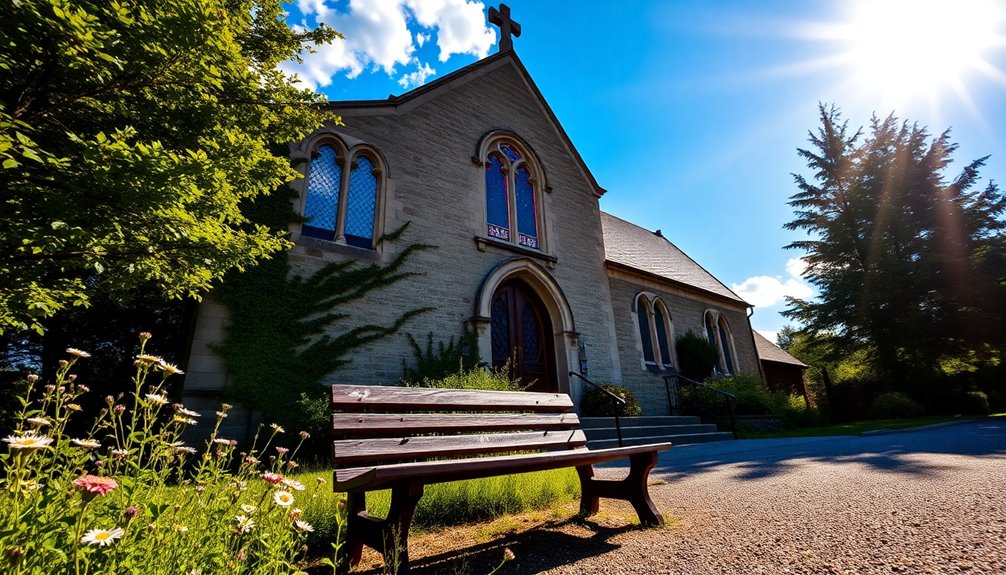If trust in your church has declined due to scandals and mismanagement, it’s important to foster transparency and open dialogue. Your community’s healing starts with acknowledging faults, promoting accountability, and showing genuine commitment to positive change. By encouraging honesty and collective effort, you can help rebuild faith and strengthen bonds within your family and congregation. Keep exploring ways to restore trust and nurture your faith community’s resilience for the future.
Key Takeaways
- Promote transparency and accountability through open communication about church practices and finances.
- Implement strict oversight and ethical guidelines to prevent misconduct and rebuild credibility.
- Foster open dialogue within families and communities to address concerns and reinforce shared values.
- Encourage member participation in decision-making and feedback to strengthen trust and engagement.
- Highlight positive actions and success stories to restore confidence and demonstrate genuine commitment to growth.

Why has trust in churches been declining in recent years? The answer lies in a series of high-profile issues that have shaken believers’ confidence and made many question the integrity of religious institutions. Clergy misconduct has played a significant role in eroding trust, as stories of leaders abusing their authority or engaging in inappropriate behavior surface more frequently. When trusted spiritual guides betray that trust, it casts doubt on the entire church community and leaves members feeling betrayed and disillusioned. These incidents often receive media attention, amplifying the damage and making it harder for congregations to see their faith communities as safe and nurturing spaces.
Clergy misconduct erodes trust, leaving members feeling betrayed and disillusioned.
Financial scandals have also contributed heavily to the decline in trust. When reports reveal church leaders mismanaging funds or pocketing donations meant for charitable causes, it fuels skepticism about the motives behind church activities. Members start questioning whether their contributions are being used ethically or if they’re simply lining the pockets of a few dishonest individuals. Such scandals foster a perception that churches are more interested in wealth and status than in living out their spiritual missions. As a result, many people feel betrayed and less inclined to participate or support their faith communities.
You might also notice that these issues create a ripple effect, affecting not just individual churches but the broader faith community. Once trust is broken, it’s challenging to rebuild, especially when scandals are repeated or mishandled. People become wary of future leadership and hesitant to fully engage in church activities, fearing their faith might be exploited or diminished. The sense of community, which should be a pillar of church life, starts to fracture as suspicion and disappointment grow. Additionally, the rise of recycled products in some church-related initiatives reflects a broader concern about sustainability and authenticity within faith communities.
However, it’s important to recognize that many churches are actively working to rebuild trust by implementing stricter oversight, transparency measures, and accountability protocols. They’re encouraging open dialogues about misconduct and financial integrity, showing a genuine commitment to change. For you, this means that finding a faith community that prioritizes honesty, ethics, and accountability can be a crucial step in restoring your confidence. Rebuilding trust isn’t just about fixing past mistakes; it’s about fostering a new culture of transparency and integrity that can help you reconnect with your faith and your community.
In the end, overcoming these challenges requires collective effort. Churches must acknowledge their faults, learn from them, and demonstrate genuine commitment to ethical conduct. As a member or potential member, your voice and involvement matter. Your feedback can push your community toward greater accountability, helping to restore the trust that’s essential for faith to thrive. When churches embrace transparency and integrity, they can begin to heal wounds and rebuild the family faith communities that are essential for spiritual growth and connection.
Frequently Asked Questions
How Can Families Personally Rebuild Trust With Their Local Churches?
You can rebuild trust with your local church through active family engagement and personal prayer. Attend services regularly, participate in church events, and volunteer together to strengthen your connection. Share your concerns honestly with church leaders and seek guidance. Personal prayer helps you find peace and clarity, fostering a genuine relationship with your faith community. Consistent involvement and communication will gradually restore trust and deepen your family’s spiritual journey.
What Role Does Leadership Accountability Play in Restoring Church Trust?
Leadership accountability plays a vital role in restoring church trust. When leaders prioritize transparency and openly communicate their actions, it builds confidence within the congregation. Implementing accountability practices, like regular oversight and honest feedback, shows they’re committed to integrity. As a family, you’ll feel more secure knowing your church’s leaders are responsible and genuine, encouraging renewed faith and stronger community bonds.
How Do Cultural Differences Influence Trust in Churches Across Communities?
You see, cultural differences shape how trust forms in churches across communities. By fostering intercultural dialogue, you create opportunities to understand diverse perspectives, which builds respect and openness. Practicing cultural sensitivity shows you’re genuinely committed to welcoming everyone, regardless of background. When you actively listen and learn, you help bridge gaps and restore trust in churches, making faith communities more inclusive and resilient for all members.
Are There Specific Denominations More Affected by Declining Trust?
Yes, some denominations are more affected by declining trust due to doctrinal differences and issues with denomination loyalty. You might notice that congregations tied to more traditional or rigid doctrines often face skepticism, while those emphasizing inclusivity tend to retain trust better. Your experience may vary, but understanding these dynamics helps you navigate faith communities and rebuild trust by fostering open dialogue and shared values.
What Are Successful Strategies for Fostering Long-Term Faith Community Loyalty?
Think of your faith community as a garden that needs tending. You foster long-term loyalty through intergenerational mentorship, where each age group nurtures the next, creating deep roots. Combine this with consistent community outreach, inviting others to join and share experiences. By actively engaging members and outsiders alike, you cultivate trust and loyalty, ensuring your faith community flourishes and endures through generations.
Conclusion
Imagine your family’s faith as a delicate garden, needing care and trust to flourish. When skepticism grows, it’s like weeds choking out the blossoms. Studies show that only 30% of people now trust churches, highlighting the challenge. But by nurturing honest conversations and community bonds, you can rebuild that trust. Just like tending a garden, restoring faith takes patience and effort—yet, the blooming of a stronger, united family faith community is worth every moment.










